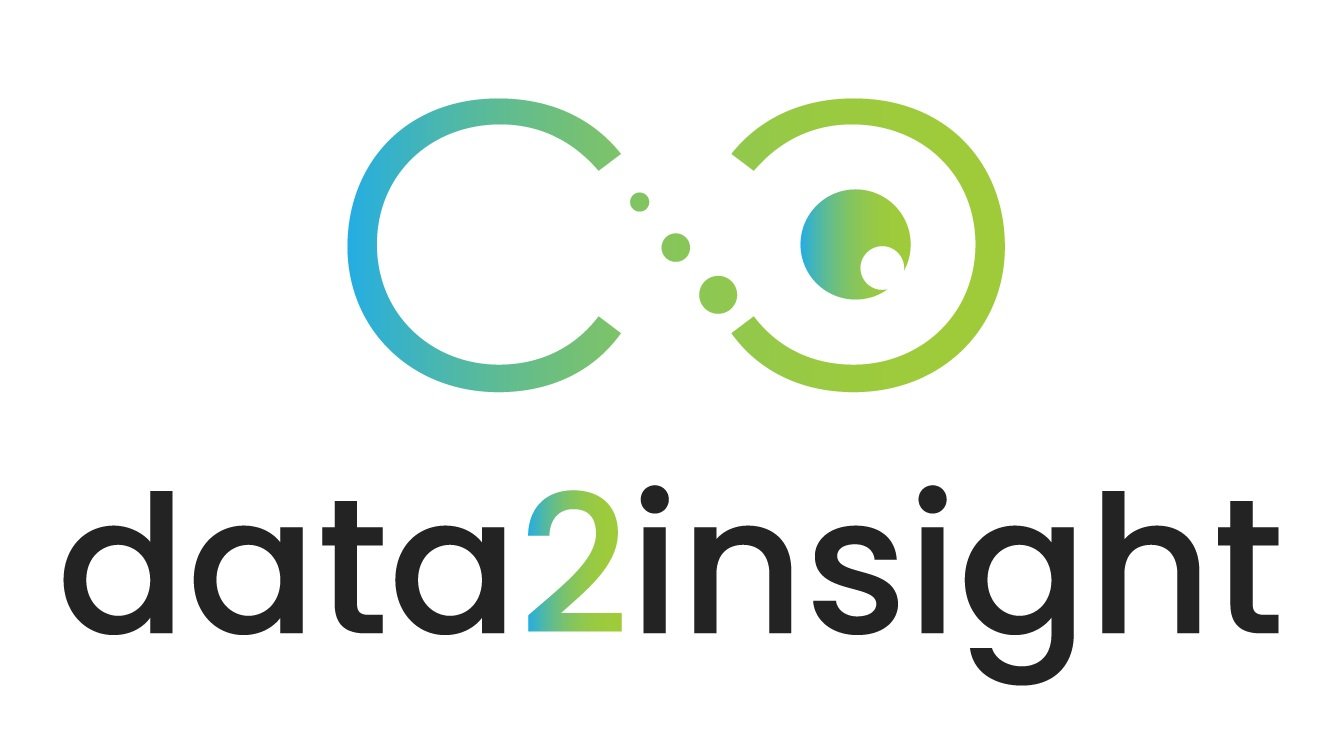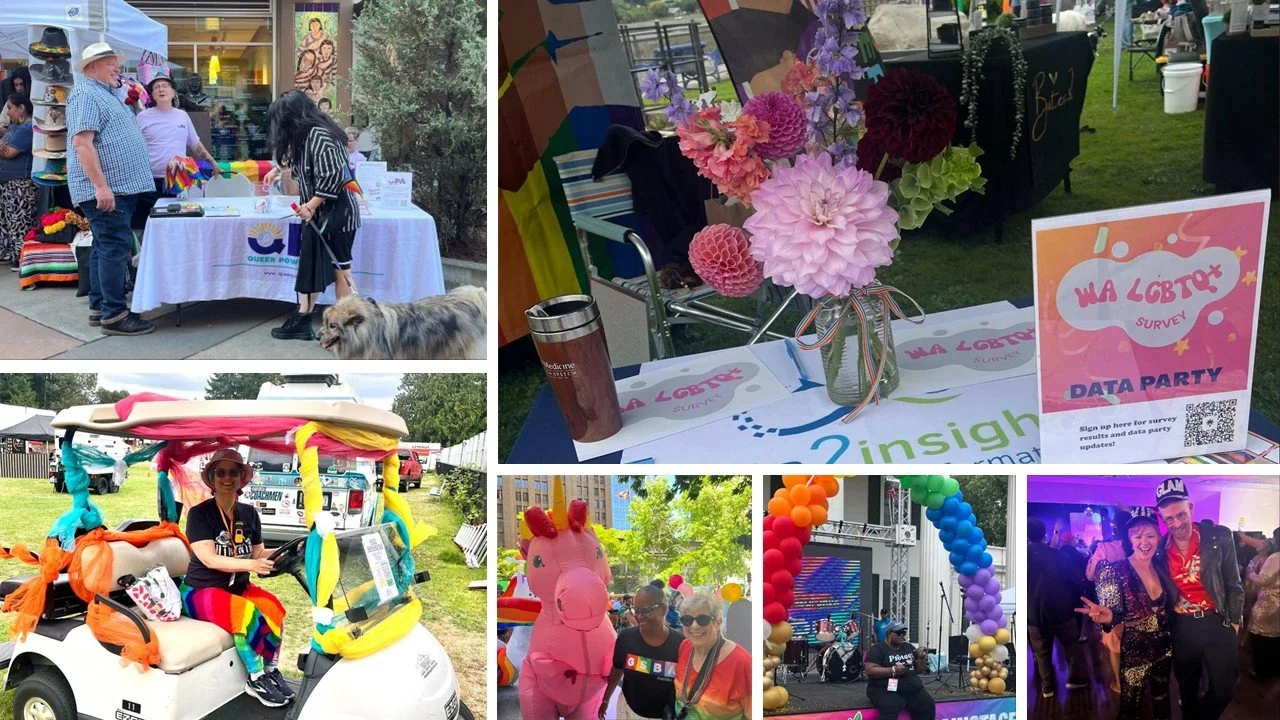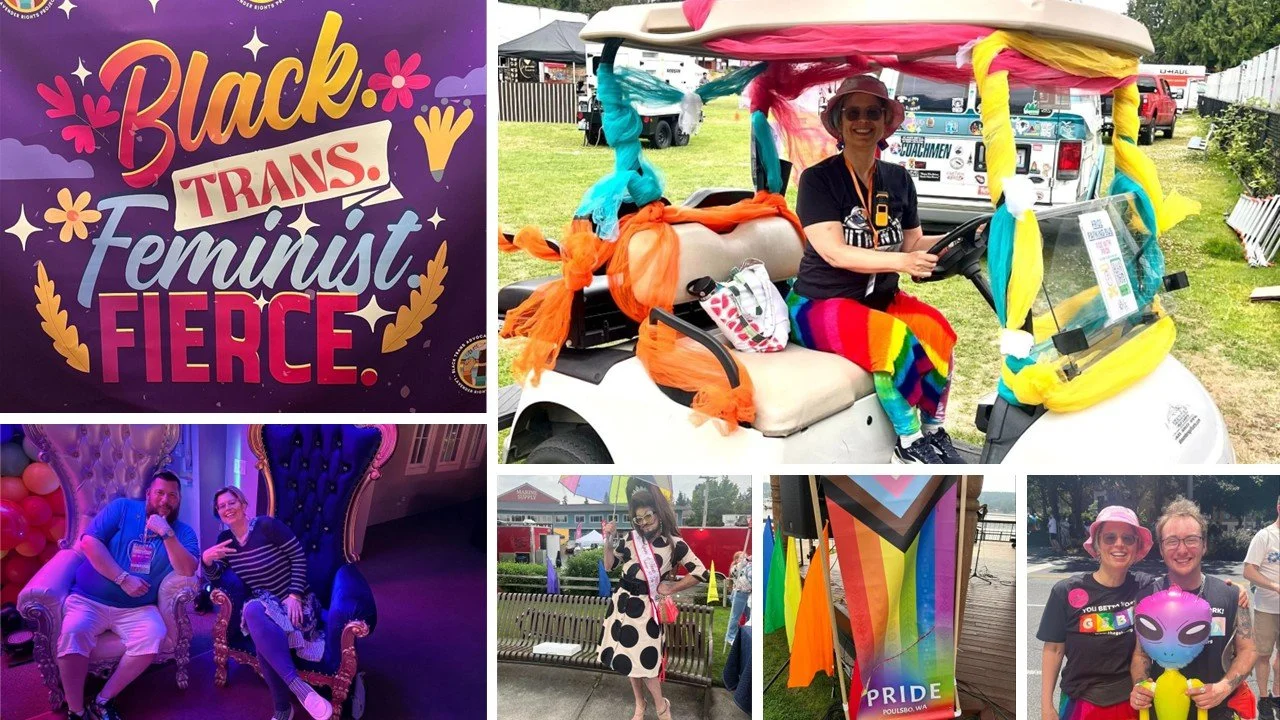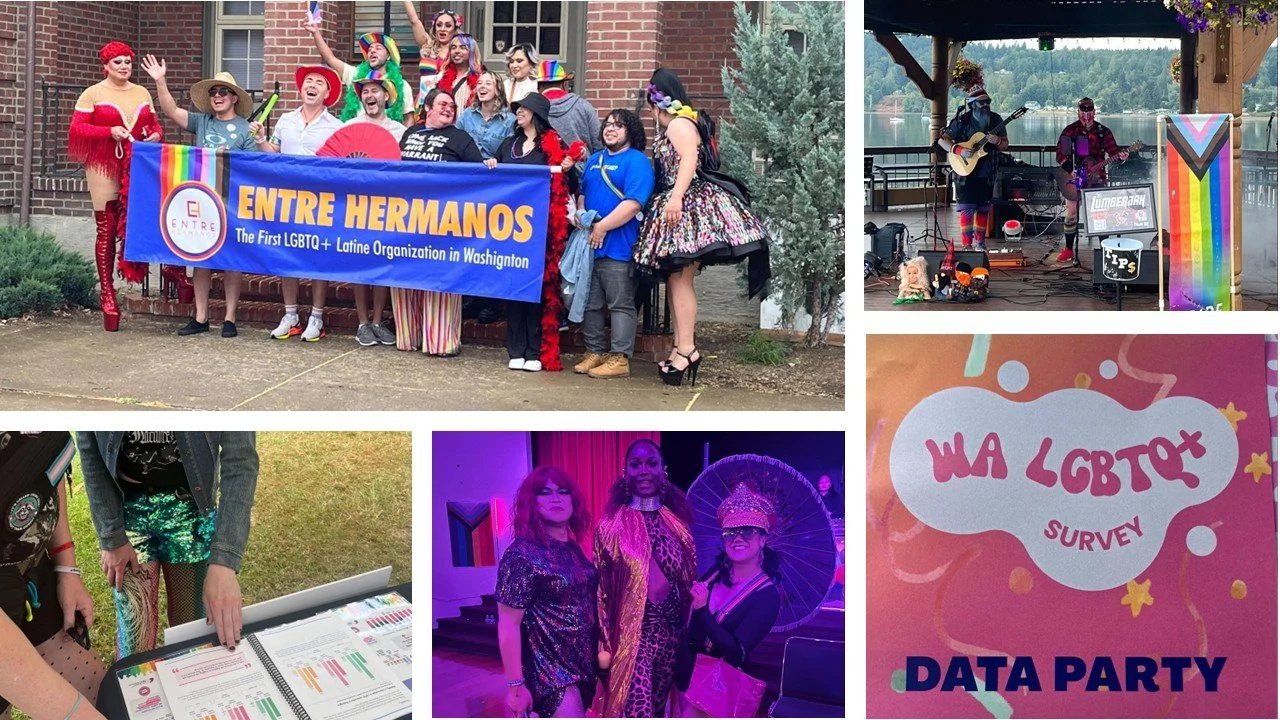Sharing Washington LGBTQ+ Survey findings with communities
Sharing WA LGBTQ+ Survey findings with communities, calling in instead of calling out, and embracing the beauty of autumn
Washington LGBTQ+ Survey: Amplifying Voices, Informing Progress
Sharing the stories of 7,000 Washingtonians to shape a more inclusive futurects.
In June 2025, Washington State University released groundbreaking findings from the Washington LGBTQ+ Survey—the first comprehensive statewide initiative to gather meaningful data from 2SLGBTQIA+ communities. Funded by the Washington State LGBTQ Commission, this landmark study amplifies marginalized voices and grounds policy decisions based on people’s lived experiences.
Why This Matters
While national trends threaten decades of progress for 2SLGBTQIA+ rights, Washington State stands as a beacon of protection and inclusion. Our state offers comprehensive anti-discrimination laws, hate crime protections, and policies that affirm the dignity of all residents. This survey bridges critical data gaps and ensures our communities' voices help to shape the policies that affect their lives.
What We Learned: Reasons for Hope
Washingtonians love their state. Respondents celebrate our community spirit, legal protections, natural beauty, safety, progressive politics, and accessible healthcare.
Policies make a difference. An overwhelming 96% of participants believe Washington's inclusive policies have improved public attitudes toward 2SLGBTQIA+ people. Nearly half have directly benefited from health policies, and one-third from workplace protections.
Washington feels safer. Participants who completed the survey after the 2024 presidential election reported feeling safer as 2SLGBTQIA+ people in Washington—perhaps recognizing our state's protections as even more valuable amid challenging and changing national dynamics.
No matter that some are trying to erase us, we will continue to share our stories until we liberate all of us!
Opportunities for Growth
The survey also revealed areas where we can do better. LGBTQ+ adolescents (ages 17 years and younger) had the highest level of depressive symptoms across age groups. Furthermore, more than 1 out of 5 WA LGBTQ+ adolescents and more than 1 in 4 18-64 year olds reported seriously considering suicide. Although public awareness has increased and wide-ranging prevention and outreach strategies have grown, gaps in crisis response persist. For example, WA LGBTQ+ adolescents were the most likely to have been unable to access medical care at least once, and to experience medical discrimination.
Please call or text 988 or chat online with the Suicide & Crisis Lifeline to get support for a mental health crisis.
Survey participants shared ideas for how our state government can do more to improve the lives of the state’s 2SLGBTQIA+ community.
Remove barriers to gender-affirming care
Improve access to healthcare, especially mental health care for LGBTQ+ youth and transgender people
Provide funding for LGBTQ+-specific addiction recovery programs
Create more safe spaces for LGBTQ+ people of color
Create more public awareness campaigns to promote LGBTQ+ acceptance
Include LGBTQ+ history in public school curriculum
Make housing more affordable
Codify LGBTQ+ rights into the state’s constitution
These findings provide clear direction for improving systems and removing obstacles for LGBTQ+ Washingtonians.
Taking it to the Community
True to research justice principles—which recognize community members as experts in their own lives—we are sharing these findings where they matter most: in community spaces across Washington.
In Summer 2025, Veronica brought survey results directly to Pride celebrations in Battle Ground, Seattle, Kitsap County, Yakima County, and Poulsbo. She has shared findings with the Washington Community Action Network and King County School-Based Health Centers. And she is helping organize a community data party, which is planned for Battle Ground, to put the power of this information directly into residents' hands.
Gratitude and Next Steps
Our team is deeply grateful for the opportunity to be a part of this research study, to increase connections and grow relationships in the community - across the state, and to continue to have community conversations with 2SLGBTQIA+ folx about putting this data to work for us. We know that leveraging data to better serve our communities will improve the lives of all Washingtonians. Together, we're building a Washington where every person's experience matters, every voice is heard, and policies and laws reflect our communities' wisdom.
Learn More:
Here is Veronica’s calendar link if you would like to chat 1:1 or discuss hosting a data party or community conversation to make sense of the data and use it for good.
Book Spotlight
Calling In: How to Start Making Change with Those You’d Rather Cancel by Loretta J. Ross was the book of choice for our Anti-fascist book club a couple months ago. Drawing from her decades in feminist activism, Ross addresses issues like leftist infighting and the need to center joy in social justice work. Everyone in the group found it powerful because of the amazing personal stories Dr. Ross shared in the book including helping convicted rapists and former White Supremacists evolve into advocates for non-violence and compassionate community.
The book provides pragmatic strategies for talking with people who we do not 100% agree with in ways that acknowledge their humanity and invite them to have conversations with people that are life affirming rather than destructive. For example, Ross tells a story about how she called in her Uncle at a family dinner. He was putting down people from other groups, as he had so many times before. Instead of calling him out by scolding him, Ross called him in by saying “I know that you love me and I love you. And that you would do anything for any one of us around the table. So, how can I reconcile that Uncle with the one who is saying these unkind words?” After that, her uncle never spoke that way again around her.
Reading this book led our book group members to consider more how they can build and grow relationships with people that they don’t agree with 100% of the time. Because Ross said that it is better to have someone who is 50% with you, than 100% against you.
Courageous, practical and very hopeful, Ross’ work is an essential read for anyone yearning to move beyond pushing people away by calling them out and toward bringing people together for meaningful, sustainable change.
#SelfCareCorner
These self-care ideas can help you embrace the beauty of fall while nurturing your mental and emotional health. Enjoy the season!
Some of our favorites are:
Take a Scenic Hike: Connect with nature and recharge.
Go Apple or Pumpkin Picking: Create seasonal memories and enjoy delicious treats.
Savor a Warm Drink: Relax and enjoy the warmth of a favorite tea, coffee, or cider.
Make a Hearty Fall Soup: Try new and favorite recipes for soups or stews that are perfect for the cooler weather.
Unplug for a Weekend: Take a break from work and household tasks to focus on self-care activities that bring you joy.
Practice Gratitude: Reflect on what you are thankful for during this season of change. One simple way to do this is to send a note to someone who has positively impacted your life. You can send it electronically via a platform like CardSnacks or go old school and send a paper card complete with handwriting and a stamp.
What’s new @data2insight?
Veronica was part of an American Evaluation Association conference panel on November 13 about collecting and protecting LGBTQIA+ and Two-spirit data. She also shared a presentation about highlights of the Washington LGBTQ+ Survey.
Conference participants were eager to discuss how they can play a part in the transformative evaluation and research that advances the liberation of LGBTQIA+ and Two-spirit people in the United States and around the world (see workshop description below).
Out in the Open: A multi-state perspective on LGBTQIA+ and Two-spirit data and how evaluators and researchers can support its collection
One of the responsibilities of evaluators and researchers is data stewardship. In 2025, there is a great need for our evaluation and research community to share responsibility for protecting and continuing to collect data that will serve the LGBTQIA+ and Two-spirit communities. This panel will discuss Sexual Orientation, Gender Identity and Expression (SOGIE) data and how it can be used to protect, advocate for, and meet the needs of this community under attack by federal and many state governments. Several queer evaluators will describe their work to better understand and serve their community in Washington state, Oregon, South Dakota, Connecticut, and New Mexico. Discussion will focus on what data is available, what gaps exist, and what collection and analysis efforts are underway or in development. Participants will learn how they can play a part in transformative evaluation and research that advances the liberation of LGBTQIA+ and Two-spirit people in the United States and around the world.









